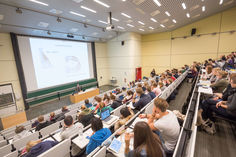- Section Nephrogenetics (AG Simons)
- Seniorprofessorship Prof. Rappold
- Molecular Neurogenetics (AG Berkel)
- Cardiogenetics (AG Hoffmann)
- Neurogastrogenetics
- Transcriptional regulation in developmental disorders (AG Laugsch)
- Genetics of neurodevelopmental disorders (AG Schaaf)
- Mouse models for neurodevelopmental disorders
- Research in our Diagnostic Laboratories
- Publications
MOUSE MODELS FOR NEURODEVELOPMENTAL DISORDERS
Autism spectrum disorders (ASD), intellectual disability and speech disorders affect around 2-3 % of the population worldwide. One of our main areas of focus is FOXP1 syndrome, an autosomal dominant disorder that is characterized by intellectual disability and speech disorders in addition to ASD or autistic traits. It is triggered by the loss of one FOXP1 gene copy, usually due to a de novo mutation.
The FOXP1 gene encodes a transcription factor that is highly conserved in vertebrates and plays a crucial role in brain development. Our research aims to better understand the effects of FOXP1 haploinsufficiency on brain development and function at the molecular level. To this end, we are using state-of-the-art techniques to investigate the changes in genetic networks in different areas of the brain, the consequences this has on neuronal activity in certain areas of the basal ganglia and on the basal ganglia circuitry, and how these disorders ultimately affect cognition and behavior.
There is no causal therapy for FOXP1 syndrome, and symptomatic treatment of the behavioral abnormalities usually does not lead to a significant improvement in the quality of life of affected individuals. For this reason, another focus of our work is on the development of a specific treatment that is intended to correct changes in the basal ganglia loop and may achieve better results than currently available therapies.
We are also working in close cooperation with the AG Schaaf on research into Schaaf-Yang syndrome (SYS) (OMIM #615547) and Bosch-Boonstra-Schaaf syndrome (BBSOAS) (OMIM #615722). To study both syndromes, we use different mouse models that mimic the genetic defects of patients.
SYS is closely related to Prader-Willi syndrome (PWS) and is caused by mutations in the MAGEL2 gene, which is located on chromosome 15 in the PWS region. Like PWS, the syndrome is characterized by neonatal hypotonia, feeding difficulties, hypogonadism, short stature and developmental delay. However, in contrast to PWS, SYS is characterized by joint contractures that can vary in severity from mild contractures of the distal phalanges to fatal arthrogryposis. In addition, there is a significantly higher prevalence of ASD in SYS patients (75-85 %) compared to around 25 % in PWS patients.
BBSOAS is caused by mutations in the NR2F1 gene. This neurodevelopmental disorder is mainly characterized by impaired vision and intellectual disability. Other associated symptoms include ASD, hypotonia and seizures.
Techniques and methods in our lab:
- Molecular biological, cell biological and physiological analyses
- Histological and immunohistological/immunofluorescent analysis of tissue sections
- Spatial transcriptome analysis on mouse brain slices using GeoMx® DSP
- Experiments on cell lines and neuronal primary cell cultures
- Three-dimensional reconstruction of cells and analysis using Imaris software
- Behavioral studies using modern sophisticated analysis systems (e.g. Laboras, IntelliCage, CatWalk)
Publications
J. Wang ⃰, H. Frohlich ⃰, F. B. Torres, R. L. Silva et al., Mitochondrial dysfunction and oxidative stress contribute to cognitive and motor impairment in FOXP1 syndrome. Proc Natl Acad Sci U S A 119, (2022). ⃰ equal contribution
J. Wang, G. A. Rappold, H. Frohlich, Disrupted Mitochondrial Network Drives Deficits of Learning and Memory in a Mouse Model of FOXP1 Haploinsufficiency. Genes (Basel) 13, (2022).
H. Frohlich, M. L. Kollmeyer, V. C. Linz, M. Stuhlinger et al., Gastrointestinal dysfunction in autism displayed by altered motility and achalasia in Foxp1 (+/-) mice. Proc Natl Acad Sci U S A 116, 22237-22245 (2019).
H. Frohlich, R. Rafiullah, N. Schmitt, S. Abele, G. A. Rappold, Foxp1 expression is essential for sex-specific murine neonatal ultrasonic vocalization. Hum Mol Genet 26, 1511-1521 (2017).
E. Sollis, S. A. Graham, A. Vino, H. Froehlich et al., Identification and functional characterization of de novo FOXP1 variants provides novel insights into the etiology of neurodevelopmental disorder. Hum Mol Genet 25, 546-557 (2016).
X. Li, J. Xiao, H. Frohlich, X. Tu et al., Foxp1 regulates cortical radial migration and neuronal morphogenesis in developing cerebral cortex. PLoS One 10, e0127671 (2015).
C. Bacon, M. Schneider ⃰, C. Le Magueresse ⃰, H. Froehlich et al., Brain-specific Foxp1 deletion impairs neuronal development and causes autistic-like behaviour. Mol Psychiatry 20, 632-639 (2015). ⃰ equal contribution
Team
Head of Section:
Medicine PhD students:
Natural sciences PHD students:
- Mohammad Aslam Panezai
- Jooyeon Song
- Section Nephrogenetics (AG Simons)
- Seniorprofessorship Prof. Rappold
- Molecular Neurogenetics (AG Berkel)
- Cardiogenetics (AG Hoffmann)
- Neurogastrogenetics
- Transcriptional regulation in developmental disorders (AG Laugsch)
- Genetics of neurodevelopmental disorders (AG Schaaf)
- Mouse models for neurodevelopmental disorders
- Research in our Diagnostic Laboratories
- Publications
![[Translate to English:] [Translate to English:]](/fileadmin/_processed_/8/2/csm_20131204_Beratung_035_a396c6c6e5.jpg)
![[Translate to English:] [Translate to English:]](/fileadmin/_processed_/a/0/csm_20170627_PflegeOrtho_001_fb912471fa.jpg)
![[Translate to English:] [Translate to English:]](/fileadmin/_processed_/f/c/csm_20170215_LaborOMZ_155_c0169c0898.jpg)
![[Translate to English:] [Translate to English:]](/fileadmin/_processed_/2/c/csm_20180523_Labor_139_6ebb9a0a1b.jpg)

![[Translate to English:] Portrait von Dr. rer. nat. Henning Martin Fröhlich [Translate to English:] Portrait von Dr. rer. nat. Henning Martin Fröhlich](/fileadmin/_processed_/2/7/csm_Froehlich_Henning_8d9869914f.jpg)